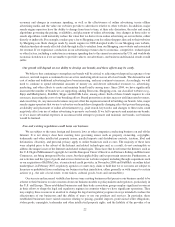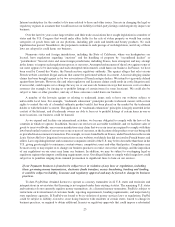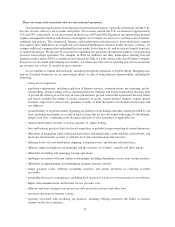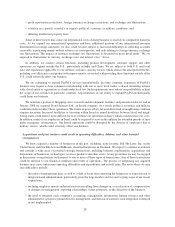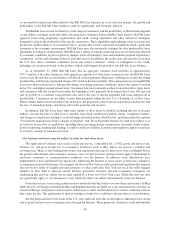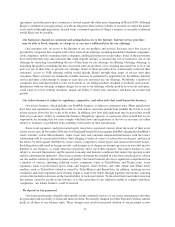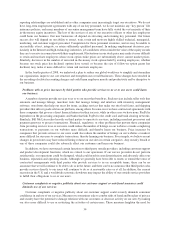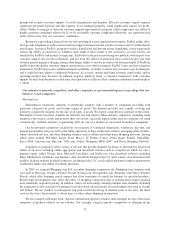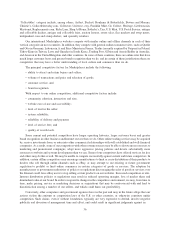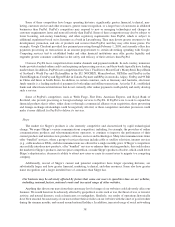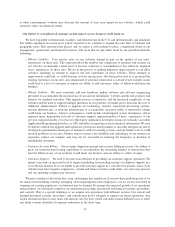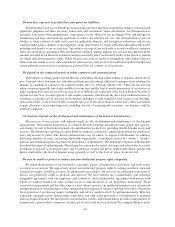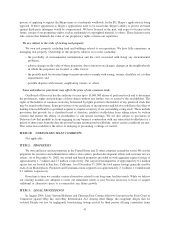eBay 2008 Annual Report Download - page 40
Download and view the complete annual report
Please find page 40 of the 2008 eBay annual report below. You can navigate through the pages in the report by either clicking on the pages listed below, or by using the keyword search tool below to find specific information within the annual report.regulatory regimes in different countries, and in most cases are subject to lower, or no, regulatory fees and lesser, or
no, specific regulatory requirements. However, the status of VoIP providers is uncertain in many jurisdictions and
Skype frequently must respond to inquiries about its regulatory status. Regulatory agencies may require Skype to
conform to rules that are difficult or impossible for it to comply with due to the nature of its communications
technologies, which could adversely affect its business. For example, while suitable alternatives may be developed
in the future, Skype is currently unable to identify the exact geographic origin of the traffic traversing the Internet or
to provide detailed calling information about computer-to- computer communications, either of which may make
complying with future regulatory requirements, such as emergency service requirements, difficult or impossible.
Governments may impose new or increased fees, taxes, and administrative burdens on VoIP companies, or
Skype may change its product offerings in a manner that subjects it to telecommunications regulations. Increased
fees could include access and other charges payable to local exchange carriers to carry and terminate traffic,
contributions to federal or state Universal Service Funds in the United States and elsewhere, and other charges. In
addition, such fees may be assessed by governments retroactively or prospectively. Skype may be required to meet
various emergency service requirements, disability access requirements, user protection requirements, number
assignment and portability requirements, and interception or wiretapping requirements, such as the Communi-
cations Assistance for Law Enforcement Act in the U.S. and similar laws in other jurisdictions. Such regulations
could result in substantial costs depending on the technical changes required to accommodate the requirements, and
any increased costs could erode Skype’s pricing advantage over competing forms of communication. Regulations
that decrease the degree of privacy for users of Skype’s products could also slow its adoption. The increasing growth
and popularity of Internet communications heightens the risk that governments will seek to regulate VoIP and
Internet communications, and Skype has received an increasing number of inquiries from regulators about its
products and services. Competitors, including the incumbent telephone companies, may devote substantial
lobbying efforts to seek greater protection for their existing businesses and increased regulation of VoIP. In the
United States, various state legislatures and regulatory agencies are beginning to impose their own requirements and
taxes on VoIP. Some countries have prohibited Skype. In many countries in which Skype products are available, the
laws that may relate to its offerings are unclear. We cannot be certain that Skype or its customers are currently in full
compliance with regulatory or other legal requirements in all countries in which Skype is used. Skype’s failure or
the failure of those with whom Skype transacts business to comply with these requirements could materially
adversely affect our business, financial condition and results of operations. In addition, increased regulatory
requirements on VoIP would increase Skype’s costs, and, as a result, our business would suffer.
New rules and regulations with respect to VoIP are being considered in various countries around the world, and
at least some of these rules and regulations are likely to be adopted and to be applicable to Skype. Such new rules
and regulations are likely to increase our costs of doing business and could prevent us from delivering our products
and offerings over the Internet, which could adversely affect Skype’s customer base, and thus its revenue.
Skype depends on key technology that is licensed from third parties.
Skype licenses technology underlying certain key components of its software from third parties it does not
control, including the technology underlying its peer-to-peer architecture and firewall traversal technology and the
video compression/decompression used to provide high video quality. Although Skype has contracts in place with
its third-party technology providers, there can be no assurance that the licensed technology or other technology that
we may seek to license in the future will continue to be available on commercially reasonable terms, or at all. The
loss of, or inability to maintain, existing licenses could result in a decrease in service quality or loss of service until
equivalent technology or suitable alternatives can be developed, identified, licensed and integrated. While we
believe Skype generally has the ability to either extend these licenses on commercially reasonable terms or identify
and obtain or develop suitable alternatives, the costs associated with licensing or developing such alternatives could
be high and the technical challenge of assuring “backward compatibility” with older versions of Skype’s technology
may be difficult to overcome. Any failure to maintain these licenses on commercially reasonable terms or to license
or develop alternative technologies would harm Skype’s business. Skype and one of its licensors are currently
attempting to resolve a dispute concerning certain key licensed technology. The parties previously entered into a
“standstill agreement” to allow further time to resolve the dispute without the possibility of immediate litigation.
While Skype is continuing to attempt to resolve the matter, in February 2009, Skype terminated this standstill
32


